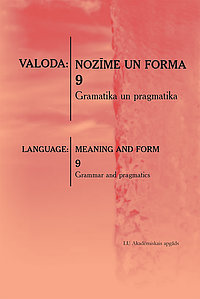Par Lietuvu latviski: sabiedriskās dzīves reāliju nosaukumi
About Lithuania in Latvian: the names of public life realias
Author(s): Regīna KvašīteSubject(s): Language studies, Lexis, Translation Studies
Published by: Latvijas Universitātes Akadēmiskais apgāds
Keywords: Latvian Language; Lithuanian Language; non-equivalent vocabulary; names of realities of public life; source language; target language;
Summary/Abstract: Each nation characterizes with realities, reflecting certain specifics, expressed by proper nouns (personal names, place-names) and appellatives. Scholars do not reach the agreement regarding the name of the layer of the spoken lexis – the terms, used in the article is equivalent-less lexis. The words, as the realities, denoted by them, are difficult to understand to representatives of other cultures. The article examines the lexis, collected from the scientific and publicist texts on Lithuania and Lithuanians, written or translated in the Latvian language. Such equivalent-less lexis is discussed classified according to semantics: the realities of folk history (randomly classified into historicisms and actualized lexis). During the study it was established that most frequently Lithuanian names are made Latvian, i. e. Latvian endings are attached to them. The meanings of the words are commented on (in brackets or comprehensively in the text or at the footnotes). However sometimes no comments are present, which shows that the addresser (the author of the article) is of the opinion that the addressee (the potential reader) understands the lexis. It is stated that there is a lack of theoretic provisions on how such equivalent-less lexis should be rendered, which, in part, depends on the style of the text, in which the lexis is used and also, to no lesser extent – on the perception of the author.
Journal: Valoda: nozīme un forma
- Issue Year: 2018
- Issue No: 9
- Page Range: 132-151
- Page Count: 22
- Language: Latvian

